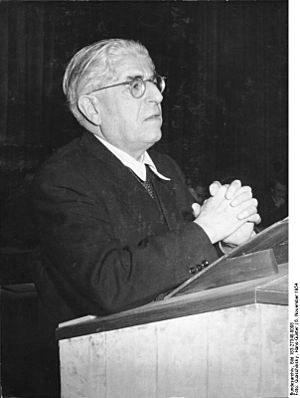Ernst Bloch facts for kids
Quick facts for kids
Ernst Bloch
|
|
|---|---|

Bloch in 1954
|
|
| Born | July 8, 1885 Ludwigshafen, Kingdom of Bavaria, German Empire
|
| Died | August 4, 1977 (aged 92) |
| Alma mater | University of Munich University of Würzburg (PhD, 1908) |
| Era | 20th-century philosophy |
| Region | Western Philosophy |
| School | Western Marxism Marxist hermeneutics |
| Institutions | Leipzig University University of Tübingen |
|
Main interests
|
Humanism, philosophy of history, nature, subjectivity, ideology, utopia, religion, theology |
|
Notable ideas
|
The principle of hope, non-simultaneity |
|
Influences
|
|
|
Influenced
|
|
Ernst Simon Bloch (July 8, 1885 – August 4, 1977) was an important German philosopher. He was known for his ideas about hope and a better future. Bloch was influenced by thinkers like Georg Wilhelm Friedrich Hegel and Karl Marx. He also looked at ideas from religious thinkers such as Thomas Müntzer.
Bloch became friends with many famous people. These included writers like Bertolt Brecht and philosophers like Walter Benjamin. His work often focused on the idea that human history is moving towards a positive goal.
Contents
Life Story
Ernst Bloch was born in Ludwigshafen, Germany. His father worked for the railway. After studying philosophy, Bloch got married several times. His third wife was Karola Bloch, an architect from Poland.
Escaping the Nazis
When the Nazis came to power in Germany, life became dangerous. The Nazis were a political group that caused a lot of harm. Bloch and his wife had to leave their home. They moved from country to country to find safety. They lived in Switzerland, Austria, France, and Czechoslovakia. Finally, they settled in the United States.
In the U.S., Bloch lived for a short time in New Hampshire. Then, he moved to Cambridge, Massachusetts. He spent a lot of time in the Widener Library at Harvard University. There, he wrote his most famous work, The Principle of Hope. He first planned to call it Dreams of a Better Life.
Return to Germany
In 1948, Bloch was offered a job teaching philosophy. This was at the University of Leipzig in East Germany. He decided to return to Germany to take this position. In 1955, he won a special award called the National Prize of the German Democratic Republic (GDR). The GDR was the official name for East Germany. He also became a member of the German Academy of Sciences. He was seen as a key thinker for the East German government.
Challenges and Later Life
However, Bloch's views changed after the Hungarian Revolution of 1956. This was a big protest against the government in Hungary. Bloch started to disagree with some of the ideas of the ruling party in East Germany. He believed strongly in human freedom.
Because of his ideas, he was forced to retire in 1957. He was 72 years old, but his age was not the real reason. Many students and professors spoke out against this decision.
In 1961, the Berlin Wall was built. This wall divided East and West Germany. Bloch was in West Germany at the time and decided not to go back to East Germany. He moved to Tübingen in West Germany. There, he received an honorary teaching position in philosophy. Ernst Bloch passed away in Tübingen.
Main Ideas
Bloch was a very unique and creative thinker. Much of his writing, especially The Principle of Hope, is written in a poetic style. It's like a long poem with deep thoughts.
The Principle of Hope
The Principle of Hope is a huge book. It talks about how humans and nature are always moving towards a better future. This idea is central to Bloch's philosophy. He believed that the universe is changing from its beginning to its final goal. He thought this change happens through how our ideas and the real world interact. Bloch saw signs of this process everywhere in human history and culture. He believed we always have hope for something new and better.
Influence on Others
Bloch's work became very important during the student Protests of 1968. These were big protests by young people around the world. His ideas also influenced a way of thinking called liberation theology. This is a way of combining religious faith with social justice.
Many thinkers have been influenced by Bloch. These include Jürgen Moltmann, who wrote Theology of Hope. Psychoanalyst Joel Kovel called Bloch "the greatest of modern utopian thinkers." A utopian thinker is someone who imagines ideal societies.
Bloch's idea of "concrete utopias" was also very important. A concrete utopia is a realistic idea for a better future. This idea was used by José Esteban Muñoz in the field of performance studies. This field looks at how people perform and express themselves. Bloch's ideas helped scholars see how performances can show possibilities for a better future.
See also
 In Spanish: Ernst Bloch para niños
In Spanish: Ernst Bloch para niños
- Exilliteratur
Images for kids
-
Endlose Treppe (Endless Staircase) by Max Bill, dedicated to Bloch's Principle of Hope.
 | James Van Der Zee |
 | Alma Thomas |
 | Ellis Wilson |
 | Margaret Taylor-Burroughs |


